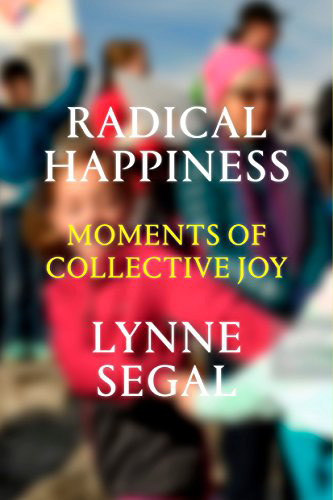How can you be happy when others are suffering? It’s a question that’s bothered me throughout my life. Part of the problem, I think, is that in Western societies, we have defined the pursuit of happiness as an individualistic endeavour. And so I lived for years in London and New York, doggedly pursuing happiness while stepping over the homeless people on the pavement.
In Radical Happiness, Lynne Segal suggests an alternative approach. Radical happiness is essentially collective happiness, achieved not by closing your eyes to other people’s misery but by actively confronting it and trying to achieve happiness for the group, not the individual. Even if such attempts don’t always meet with success, the attempt itself can lead to happiness.
The problem with the individualistic approach to happiness in an unjust world is that it tends to lead to the closing of the eyes. Segal quotes Tennessee Williams who, when asked by a reporter to define happiness, responded:
“Insensitivity, I guess.”
Hence the hordes of privileged people now complaining that the news is “too depressing” and they prefer to block it out. It’s true, the news is depressing. But if things are so depressing to watch, how depressing must they be to experience? And is it fair just to turn away because it doesn’t affect you personally? Is that likely to lead to real happiness?
Although there’s a good argument to be made for avoiding the minute-by-minute coverage of the 24-hour news cycle, I think that blocking out the bad stuff altogether is not the solution. The response suggested by Radical Happiness is: If the news is bad, get up off the couch and try to make it better. (Those are my words, not Segal’s, but I think they’re consistent with her arguments in the book.)
After setting out her argument, Segal goes on to explore the concept of radical happiness through various different historical examples, such as the fight for women’s rights, sexual liberation, and others. In some of these, I found that the overall argument about the nature of happiness got lost somewhat amid the details of what happened. But others were more focused on the subject. I loved her exploration of literary utopias through the ages and how in the 20th century our visions of the future took a dramatic turn towards the dystopian.
Overall, I’d recommend Radical Happiness as a great introduction to the concept of pursuing collective rather than individual happiness. I loved Segal’s explorations of joy in collective moments, from mass protest to the Olympic Games. And the notes, which make up a third of the book, are a treasure trove of resources on happiness, utopianism and radical politics, so this book is the ideal starting point for anyone who wants to explore the limits of the individual pursuit of happiness and the possibilities for something different.
For me, it was a reminder to focus more on the things I care about and to actually get involved more often in trying to make things better as I travel through this world.





There are 6 comments
Thanks Andrew. I’m also frequently hearing people who were previously engaged with news and current events saying they can no longer bear to hear it. I think it’s important as you say
to be selective about what/ how we hear news to maintain positivity- and good that a book like this can help us focus on one or two issues we feel we can do something about.
Hi Mandy, Yes, it can get overwhelming, can’t it? (And it’s probably got even worse since you left your comment!) I think you’re right about being selective and taking action. The worst part is the feeling of powerlessness you get when you read about, say, the burning Amazon rainforest. But if you can organise a protest or run an event or donate to a charity fighting it or write a letter to your MP or make personal changes or just do something to change the situation, it feels better. And, as Segal notes, it feels even better when you do these things as part of a collective effort with like-minded people. That’s certainly been my experience too.
This is such an awesome interesting concept. It has raised questions in my mind. Fighting for a better world and for the benefit of others is a vital and noble thing to do. Is it a way to share collective happiness? Perhaps. These are such intriguing concepts. I should read this book.
Yes, the distinction between individual and collective happiness was an interesting and new one for me too, Brian. It’s definitely a thought-provoking book!
Thank you for the time you have put into this post. Your perspective (and blog in general) is enlightening, heart-felt and incredibly genuine. This piece has forced me to ask myself, “What have I done for others today or lately are my actions individualistic?”
Hi Meagan, thanks for visiting and for leaving such a lovely comment. I appreciate it! That is a great question to ask — I think I’ll start asking it myself. To be honest, I’d be in the “individualistic” category most days, I think. Acting for the collective good is more the exception than the rule, but that’s definitely something I’d like to change.